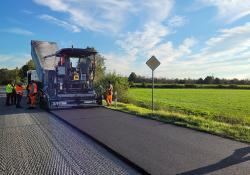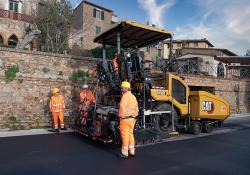
The UK Government is offering funding for innovative projects to decarbonise UK roads. The £30 million grant will be provided to seven new regional projects across the UK to boost innovation in decarbonising roads
Winning projects include ‘carbon capturing’ cement and green waste being used to make asphalt. The projects aim to ensure the latest tech and innovations can reduce emissions, improve regional connectivity and accelerate the journey to net-zero local roads. Future roads could be built using asphalt made from waste materials and ‘carbon capturing’ cement.
The seven projects are spread across the UK. The programme supports projects led by Local Highways Authorities focused on tackling the long-term decarbonisation of highways infrastructure, such as streetlights, and transforming local authorities’ approach to decarbonising roads.
The winning projects include cutting carbon emissions from our streetlights to producing asphalt made from green waste. Other projects plan to drive changes to the design, construction and maintenance of typical UK highway construction, as well as plans to develop a first-of-its-kind system approach to creating a net carbon negative model for green infrastructure delivery.
The seven successful Local Highways Authorities and their partners will be provided funding, subject to due diligence, to develop, test, pilot and roll out new technologies to facilitate decarbonisation, including in supply chain emissions. The seven successful bids are:
• Highways CO2llaboration Centre for materials decarbonisation, Transport for West Midlands: Supporting upskilling and developing a team in the West Midlands to decarbonise highways via two initiatives, including a ‘Highways CO2llaboration Centre’, and demonstrator sites showcasing and monitoring innovative decarbonised highway materials.
• UK Centre of Excellence for Material Decarbonisation in Local Roads, North Lanarkshire Council: Creating a centre that will develop a materials testing programme identifying and deploying the latest tech for road construction, in addition to testing and deploying recycled materials from other industries to build roads.
• A net carbon-negative model for green infrastructure management, South Gloucestershire Council and West Sussex County Council: Aims to develop a first-of-its-kind approach to creating a net carbon negative model for building and delivering green infrastructure, for example recycling biomass from green waste.
• A382 Carbon Negative Project, Devon County Council: Aims to drive changes to the design, construction and maintenance in typical aspects of highway construction to reduce carbon emissions, and to build a new link road including walking and cycling options.
• Ecosystem of Things, Liverpool City Council: Aims to introduce an ‘Ecosystem of Things’, exploring a scalable and transferrable approach to understanding various systems (including design, public spaces, materials/process technology, recycling infrastructure and the legal, contractual and procurement processes) at city level to embed and adopt decarbonisation initiatives.
• Decarbonising street lighting, East Riding of Yorkshire Council: Plans to work on increasing efficiency for low carbon lighting to make sure they can still be clearly seen by drivers and to create a framework for an alternative manual for highway lighting, signing and road marking.
• Net Zero Corridors, Wessex Partnership: Will pioneer net zero roads that are built without creating more carbon emissions overall in Somerset, Cornwall, and Hampshire in 9 ‘net zero corridors’ linking rural and urban areas.
Live Labs 2 is designed to ensure innovations are shared across the whole of the UK and bidders were encouraged to create partnerships across the public and private sector, and academia. The winning projects will be working together across four interconnected themes. These include a green carbon laboratory: examining the role that non-operational highways ‘green’ assets can play in providing a source of materials and fuels to decarbonise highway operations, for example, using biomass from green waste to create alternative fuels and asphalt additives. They also include a future lighting testbed: researching the future of lighting for local roads to determine what is needed in the future and how they can be further decarbonised. In addition, a UK centre of excellence for materials will provide a centralised hub for research and innovation that would help test construction materials and their use. And corridor and place-based decarbonization will help deliver decarbonisation across speciffic, wider regions and corridors covering both urban and rural areas.
Live Labs 2 is funded by the Department of Transport (DfT) and organised by The Association of Directors of Environment, Economy, Planning & Transport (ADEPT), which represents 'directors of place' who are responsible for providing day-to-day services, such as local highways, as well as strategic long-term delivery.
This programme follows the previous and successful Live Labs 1, a £22.9 million innovation programme that focused on adoption of digital technology across the local roads sector in England.










